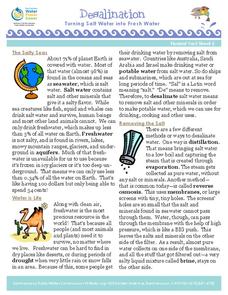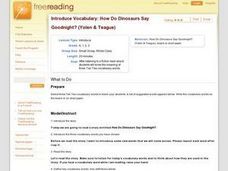Curated OER
Introduce Vocabulary: For You are a Kenyan Child (Chunnane)
Discover that Kenyan children aren't much different from your young scholars as they read Kelly Cunnane's story For You are a Kenyan Child. This story is an excellent resource for vocabulary in context, and introduces new words...
Curated OER
Introduce Vocabulary: One Hungry Monster (O'Keefe)
Combine counting and vocabulary practice with Susan O'Keefe's engaging story One Hungry Monster, which you can find on YouTube if needed. Introduce learners to the following in-text words: doubt, gargle, rude, swear, and underneath....
Curated OER
Relatives
Primary learners read the text The Relatives Came and make text to self-connections. In this literature discussion, they discuss what the text reminds them of in their own lives. They can also write down their connections and share them.
Curated OER
Introduce Vocabulary: Into the A, B, Sea (Rose)
As budding readers learn about the ocean, they'll get practice with the alphabet and new vocabulary words (cling, nab, prey, slumber, and thrive) in context. Read Deborah Rose's book Into the A, B, Sea, which includes a glossary in the...
Curated OER
Introduce Vocabulary: Miss Spider's Tea Party (Kirk)
Learning new vocabulary words is best done in the context of an engaging story like David Kirk's Miss Spider's Tea Party. New readers (or almost-readers) focus on any of 12 new words: conceal, courtesy, demand, descend, dread, fragile,...
Curated OER
Introduce Vocabulary: Froggy Goes to School (London)
Just like your budding readers may have felt, Froggy is nervous on his first day of school. Use Johnathan London's book Froggy Goes to School to practice vocabulary in context. Prior to reading the story aloud, pre-teach the new words...
Curated OER
Introduce Vocabulary: Hot Air: The (Mostly) True Story of the First Hot-Air Balloon Ride (Priceman)
What a fun way to explore new vocabulary words! Marjorie Priceman's book Hot Air: The (Mostly) True Story of the First Hot-Air Balloon Ride offers plenty of new words for scholars to learn in context: amateur, assembled, demonstration,...
Curated OER
Introduce Vocabulary: Ruby the Copycat (Rathmann)
Have your scholars ever known someone who was a copycat? Approach this issue as you study vocabulary in context by reading Peggy Rathmann's book Ruby the Copycat. Proposed focus words are: recite, murmur, plop, and coincidence. Go over...
Curated OER
Introduce Vocabulary: Some Birthday! (Polacco)
Patricia Polacco weaves an engaging tale for budding readers in her book Some Birthday!, an excellent resource for vocabulary in context. You can use this text to introduce the following words: investigate, snarl, and squawk. After a...
Curated OER
Introduce Vocabulary: Letting Swift River Go (Yolen)
If your class is reading Jane Yolen's Letting Swift River Go, explore these vocabulary words in context: faint, quench, remain, and sacred. Before reading the story aloud, acquaint learners with these words briefly. As you read,...
Curated OER
Making Predictions by Analyzing Key Ideas and Details
Pupils make predictions. In this language arts instructional activity, students read nonfiction texts and make predictions about what they are going to read. Pupils confirm and revise their predictions as they read the text.
Crabtree Publishing
Remarkable Lives Revealed
Six lessons make up a unit all about biographies. Scholars read about a remarkable life while taking notes and identifying characteristics of the biographical genre. Readers examine the tale's obstacles, accomplishments, and sequence of...
Curriculum Corner
Inferencing
Inferencing is a necessary reading skill to uncover non-explicit messages in text. Use the set of resources as a way to guide learners toward becoming expert inferrers through reading prompts and literature with text and without text.
K12 Reader
Displaying Data
It's important to learn how to display data to make the information easier for people to understand. A reading activity prompts kids to use context clues to answer five comprehension questions after reading several paragraphs about...
Curated OER
Making History....Literary
Connect the Common Core ELA standards with history by employing a balanced literacy approach to reading.
Florida Center for Reading Research
Vocabulary: Word Meaning, Inside Information
Support the acquisition of content area vocabulary with this foldable resource. With space for studying three new terms, pupils determine the definition, write a sentence, and provide examples for each word.
T. Smith Publishing
Writing a Friendly Letter
Just because kids today are well-versed in texting and emails doesn't mean they shouldn't learn how to write a friendly letter! Reinforce their letter-writing skills with a lesson focused on the elements of a friendly letter, as well as...
Curated OER
Running the Road to ABC
Second graders, while reading and discussing the book, "The Best Older Sister," by Sook Nyul Choi, practices predicting the meaning of a passage based on its title and illustrations. They experience determining the main idea from text...
San Francisco Public Utilities Commission
Desalination: Turning Salt Water into Fresh Water
How does San Francisco supply its citizens with enough water, even during a drought? Learn about reservoirs and why desalination could be a good solution with a reading passage about water conservation. After kids finish the...
Curated OER
Introduce Vocabulary: How Do Dinosaurs Say Goodnight?
Students explore tier two vocabulary. In this vocabulary lesson, students read How Do Dinosaurs Say Goodnight? and assess the meaning of new vocabulary words found in the story. Students record their new words using a word journal or...
Curated OER
Introduce Vocabulary: It's Pumpkin Time
Students predict the meaning of tier two vocabulary words. For this vocabulary lesson, students investigate the meaning of new vocabulary words while reading It's Pumpkin Time. Students record their new words in a word journal or...
Curated OER
Introduce Vocabulary: Ruby the Copycat
Young scholars analyze tier two vocabulary words. In this vocabulary activity, students explore vocabulary words used in Ruby the Copycat. Young scholars assess the meaning of new vocabulary words and record their new words in a word...
Curated OER
Using Non-Text Features
Second graders examine graphs and charts from their local newspaper. As a class, they discuss what the data means and how it relates to the article. In groups, they are shown two sets of graphs or charts and they practice explaining...
Curated OER
Introduce Vocabulary: Cross a Bridge (Hunter)
What does suspension mean? Learn this and other bridge-related vocabulary as scholars listen to Ryan Ann Hunter's nonfiction book, Cross a Bridge. This strategy can be applied to any book. Before reading, acquaint pupils with the new...

























